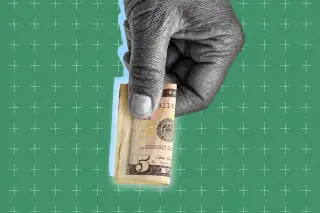The $35 Overdraft Fee Is Officially Dead

Consumers may not have to shell out for hefty overdraft penalties after the Consumer Financial Protection Bureau finalized a new rule that aims to significantly curtail banks’ ability to charge customers these fees.
"The CFPB is cracking down on these excessive junk fees," agency director Rohit Chopra said Thursday in a statement accompanying the rule announcement. Overdraft fees are now capped at $5, or at an amount just high enough to cover banks' costs or losses, estimated to be between $3 and $14. The CFPB says this will save a household that pays overdraft fees $225 a year — $5 billion in annual savings for American consumers in total.
Consumer-focused organizations praised the new rule. Adam Rust, director of financial services at the Consumer Federation of America, called the rule a “major milestone” in reversing the balance of power that favors big banks over ordinary Americans.
“No one should have to pick between paying a junk overdraft fee or buying groceries,” Rust said in a statement.
Chopra called overdraft fees a “legal loophole," saying that if banks want to continue charging overdraft fees — which are typically about $35 and can be high as $37 — then they will be required to treat them more akin to short-term loans or lines of credit.
"Right now, when you take out a loan, you get clear disclosures. There's some core consumer protections. The overdraft loophole allows banks to sidestep that," he told Money in an earlier interview.
While the distinction might seem like a subtle shift, in practice, this changes the entire structure of how overdraft fees are charged. There is a significant regulatory infrastructure built up around consumer lending. The CFPB says banks that want to continue assessing overdrafts will have to give consumers a choice on whether they wanted to open a line of credit, provide account disclosures that would allow comparison shopping, send periodic statements and give consumers the option to pay automatically or manually.
From a consumer education standpoint, the most significant of these are the disclosures that would frame that $35 overdraft charge as a short-term loan. Earlier CFPB research calculated that if a bank customer overdrew — or borrowed — $24 for three days and paid a $34 overdraft fee, that would amount to a loan with a whopping 17,000% APR.
The CFPB notes that some banks have voluntarily been reducing the amount or the frequency with which they charge overdraft fees, with many big banks now waiving penalties for small-dollar overdrafts. Despite these changes, though, consumers still paid $5.8 billion in overdraft and insufficient-fund fees in 2023, the agency says. The rule also exempts financial institutions that have less than $10 billion in assets.
This is the latest move in a broad Biden administration crackdown on what regulators have labeled “junk fees” on everything from hotel bookings to banking transactions. Last year, the White House tasked the CFPB as well as the Federal Trade Commission with stamping out the proliferation of add-on fees, service charges and other ancillary expenses, which officials estimate cost American families “tens of billions of dollars a year.” The White House also announced in August that it would take sweeping action against what it characterized as “corporate tricks and scams” that enrich big businesses at the expense of their customers.
The new overdraft cap rule doesn’t take effect until Oct. 1, 2025, so it’s possible that the incoming Trump administration or GOP-led Congress could squash it.
Christine Hines, senior policy director at National Association of Consumer Advocates, warns that the rule could be undone by lawmakers if they subject it to a legislative lookback period that lets them reverse late-term regulatory changes. “The only way that this rule can live up to its promises to put money back into families’ pockets is if members of Congress support this important economic action for their constituents and simply let the rule go into effect,” she said in a statement.
More from Money:
Inside the Biden Administration's Plan to Stop 'Out-of-Control' Overdraft Fees
White House Takes Aim at ‘Corporate Tricks’ That Waste People’s Time and Money